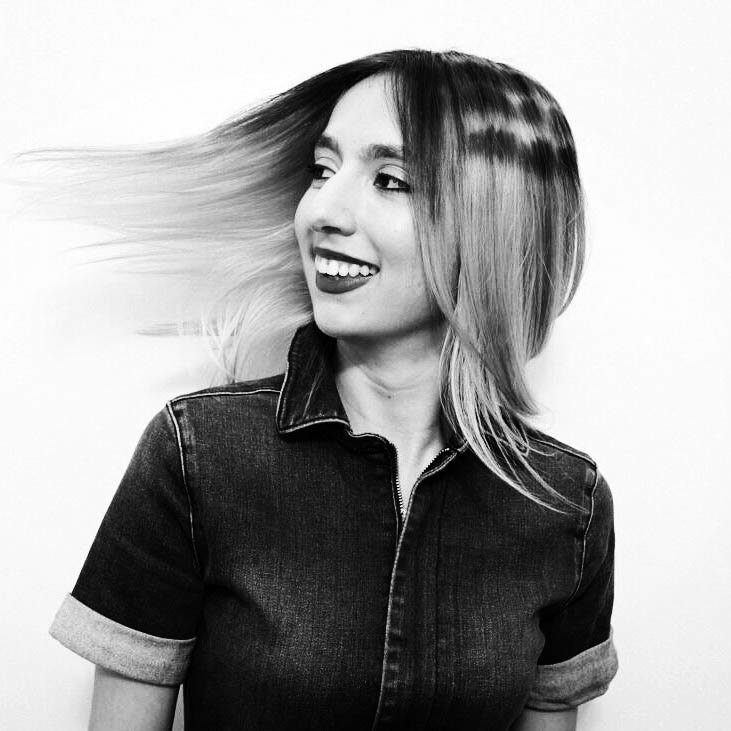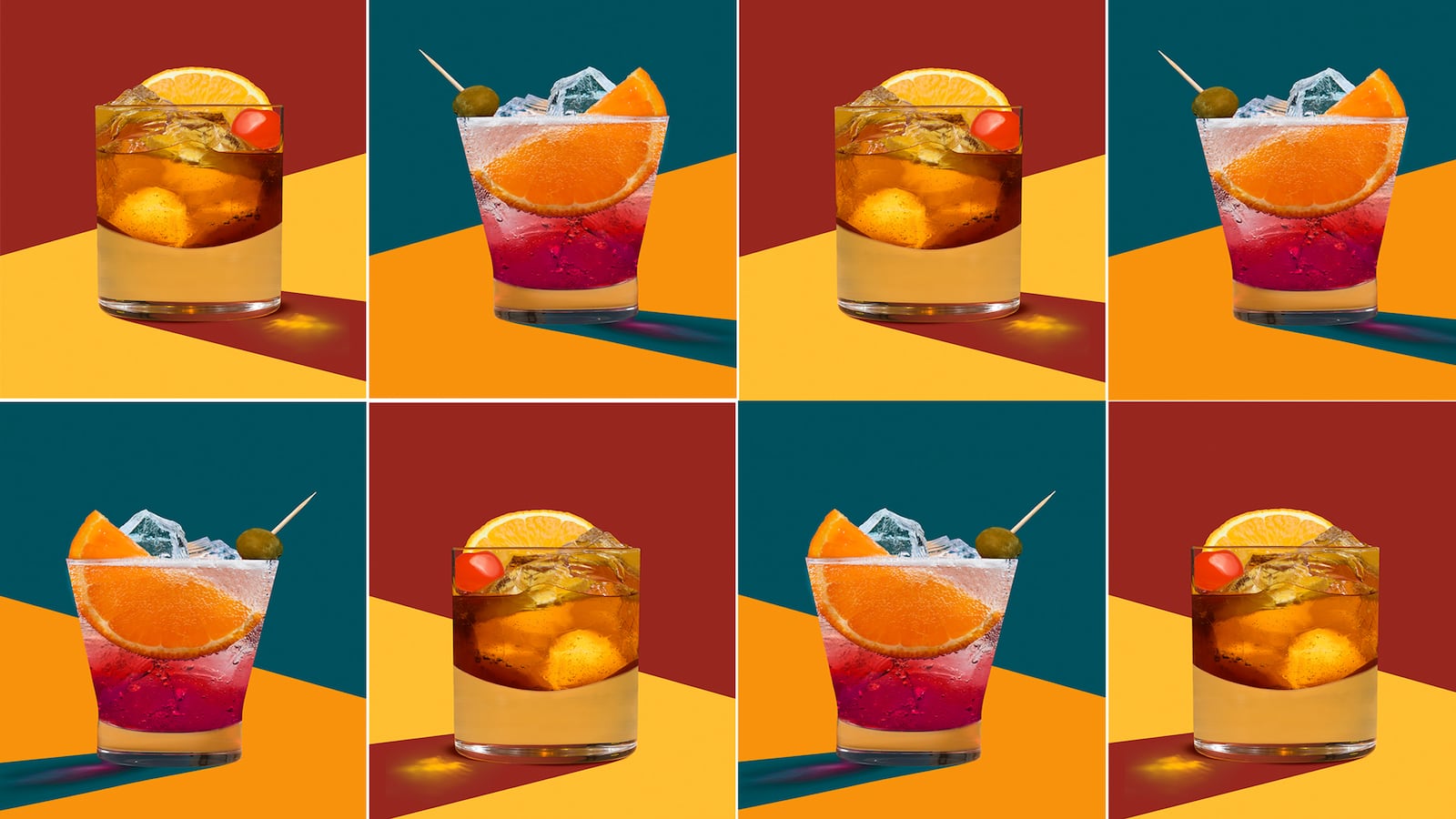It was around 9 p.m. at a corner bar off a main drag in Greenpoint, Brooklyn. Two good friends and I raised froth-filled cocktail glasses, the loudest among us punctuating our cheers with a bellowing, “Yaas!” It was an entirely unexceptional scene that could have taken place in any one of New York’s thousands of bars. But there was one crucial difference.
We were imbibing at Getaway, a two-week-old bar where no alcohol is served. Our highball and coup cups were filled not with the usual whiskey or mezcal, but a hodgepodge of gussied-up mocktail ingredients like coconut milk and elderflower syrup.
Call us squares, suckers, or both, but we left the bar laughing, arms around each other. In that grand, drunk tradition, I told one friend how much I love her. We did not need alcohol to get to that happy place, but I’m sure our sugar high helped.
Getaway is just one of the latest sober bars to open in New York. One pop up, Listen Bar, with faux beer and kombucha on tap, is currently crowdfunding for a permanent space. Ambrosia Elixirs, which promises “the taste of sacred intention” in every zero-proof sip, has been in Bushwick for three years, but will expand to spaces in Williamsburg and Manhattan this spring.
Across the pond in London, even famously beer-happy Brits can turn to he dramatically named Redemption Bar for beetroot martinis and “Pious Pina Coladas.” The bar’s founders, entrepreneurs Catherine Salway and Andrew Waters, were reportedly inspired to open Redemption after wondering, “Why should socializing always be at the expense of your health?”
A few weeks before the opening of Getaway, Amanda Mull wrote in The Atlantic that there is quite a bit of anecdotal evidence to suggest that “millennials are sick of drinking.” While statistics still show that more than 60 percent of 22 to 37 year olds drink alcohol every month, they might be drinking less.
“What some have been quick to characterize as an interest in being sober might actually be more like a search for moderation in a culture that has long treated alcohol like a dichotomy: Either you drink when the opportunity presents itself, or you don’t drink at all,” Mull wrote.
In this way, a kind of sober tourism has emerged. Think of friends who have gone alc-free for the 31 days of “Dry January” as a testament to willpower or made a point to buy less beer as a way to feel healthy. Regardless of how truly popular these subtle movements truly are, booze-less buzz has garnered enough interest for the wellness industry to take note.
“NYC’s sober bar scene is a ‘hip’ oasis for booze-free fun,” read a recent New York Post headline. The piece quoted a former club promoter and Getaway patron who said, “Sobriety is only going to get more cool.”
Sobriety can be cool, sure, but also very necessary—and lifesaving—for alcoholics. Is the idea of temperance becoming the next Goop-y trend à la reiki, yoga, or weed, just a little bit insensitive?
“It smells of privilege, but I’m into it,” a sober friend told me when I sent her the Post story. “I think it’s dope. I want to go get fun mocktails and have a night of pure connection, you know?”
“I know people were saying ‘fuck this’ because of the price of these drinks,” said one sober Getaway patron who lived down the block. “But I said, yes! Finally.”
AA did not make a representative available for a Daily Beast interview. According to the organization’s “Tenth Tradition,” “Alcoholics Anonymous has no opinion on outside issues; hence the A.A. name ought never be drawn into public controversy.”
A spokesperson for the fellowship added, “In keeping with this Tradition, the A.A. Fellowship does not develop or offer opinions on any other organization, cause, treatment, medications, legislation, housing, sober bars, non-alcoholic beverages, or the alcohol industry. This tradition is one of several that helps us avoid the distraction that focusing on other issues might cause.”
Dr. Carrie Wilkens, co-founder of the Center for Motivation and Change, a private mental health practice in New York that specializes in substance use treatment, said she might start telling patients to visit an alcohol-free bar as a “homework assignment.”
“Maybe for some people a mocktail might be triggering and they may feel, ‘I want to have the real thing,’” Dr. Wilkens said. “But we would be setting it up as: Go and notice what it feels like to be sober. Have a good time. Go to this place with the expectation that you’ll have fun and there is no alcohol involved.”
If I may add, go to Getaway when you’ve got money to spend. The mocktails—with names like “Daters Gonna Date” and “That’s Just My Face”— cost $13. Ciders will set you back $6 each.
A Getaway bartender told me that most people start with pricey virgin drinks out of curiosity, but stick to cheaper options for round two. (My friends and I eschewed thriftiness and left with a $78 bill for six drinks and a hummus plate).
For Dr. Wilkens, if sobriety has to earn the troublesome—and expensive— “trendy” title to reduce the stigma around abstaining from drink, so be it. “For people to say, I’m a fun, sober person, I can’t imagine what would be wrong with that,” she shrugged.
Getaway is conveniently sandwiched between two Alcoholics Anonymous meeting centers within walking distance. But just as co-founders Sam Thonis and Regina Dellea will not check IDs at the door, the pair feel no need to ask customers if they are sober or not.
“It is just not a fun question,” Thonis said. Sometimes, AA members will leave “nice notes” on the receipt thanking their bartenders for opening a space.
While one might think of a sober bar as a glorified coffee shop, Getaway's proprietors still want the space to exude a communal, pub-like feel. Unlike Starbucks, the menu respectfully requests that patrons do not use laptops while inside.
Michael Scippa, public affairs director for the industry watchdog group Alcohol Justice, also believes that temperance does not have to kill the party.
“When they banned smoking, everyone said it was going to be the end of bars,” Scippa said. “Of course, none of that happened. It wasn't horrible. Bars are still flourishing. I think we’re probably about 20 years behind tobacco in terms of educating folks to the true dangers of a toxic substance.”
Thonis hopes to soon host trivia nights and other community programs, though Getaway declined a DJ’s recent offer to host a dance party. (The space is just a little too small for that, and the sceney vibe is less Top 40 and more Todd Rundgren on vinyl.)
According to the owners, Thursdays are the quietest nights at Getaway, which is open from 5pm to midnight. That was true when I stopped in last week, when only two sets of couples were out on dates. I was promised things get rowdy on the weekend, but Saturday around 10:30 pm the place was empty. Not wanting to sit alone, my group ended up at a nearby pub.
Getaway’s proprietors swear they have opened an agenda-less space that just so happens to serve no alcohol. As made evident by the saccharine cocktails, it is not a health-focused juice bar. In Thonis’ words, “If you want to eat a cheeseburger before you come here, eat a cheeseburger.”
Jen Batchelor grew up around alcohol—180-proof moonshine, that is. Growing up in Saudi Arabia, where drinking is illegal, Batchelor was the daughter of an expat who made his own black market hooch. “I had this unconventional introduction to alcohol, but I saw it as a unifier of community—it can bring people together,” she said.
Years later, Batchelor worked at a hospitality and wellness startup. “It’s easy to drink every night if you’re moving and shaking in New York,” Batchelor said. “When people say, ‘Let’s grab a drink,’ they really just want to connect, catch up, find a business opportunity. We’re requiring our brains to be happy and with it and be good listeners, but two or three glasses of wine in, I’m not that.”
Batchelor, a student of ayurvedic medicine, launched Kin Euphorics last December. The alcohol-free spirit is made with nootropics, also known as smart drugs.
Such substances are also found in caffeine, nicotine, and amphetamines. Though detailed research is sketchy, nootropics stimulate the brain’s release of dopamine, the feel-good hormone.
Kin launched last December via a glossy Vogue article; since then, Batchelor says the company has attracted 20,000 customers. “If you did a scrub of our list, you’re going to get folks from the entertainment world or freelancers who cannot afford the downtime, be bloated, be hungover. That is time wasted, not spent doing our best,” she said.
Batchelor’s mission is not anti-alcohol. In her words, “I want people who have been reevaluating their relationship with alcohol—or the toxic, mindless habits of their life in general—to have an option that is relevant and respectful of them.” That option will not come cheap, though: Kin costs $47, on par with a bottle of the real stuff.
Much like Getaway’s owners, Batchelor has refrained from actively marketing Kin to alcoholics.
“If you are in recovery, Kin is not a substitution for that work,” she said. “There is a real psychoactive effect when it comes to Kin—we are absolutely stimulating your bliss molecules for pleasure and joy.” A respectable disclaimer, sure, but also a sneaky sales pitch. Who among us does not need some serious bliss stimulation?
I drank Kin on a recent Tuesday night at home with a friend. The sweet taste went down easy, but as my friend became giddy—that ‘oh God, mom has a wine-buzz’ kind of giddy—I felt next to nothing.
When I told Batchelor this, she said, “Kin affects everyone differently. Feeling really yourself, rejuvenated, energized is the typical feeling we hear about. People just want to dance, or just want to chill.”
For my part, I did sleep very well that night—and of course, woke up without a hangover (or, important to note, a sugar headache).
Kin is not the only non-alcoholic spirit in town, but with its juicy red coloring and minimalist packaging, it just may be the prettiest.
Earlier this year, Heineken launched a zero-proof beer in splashy fashion, enlisting The Office’s Angela Martin and Brian Baumgartner to hype it. Diageo, the world’s largest producer of spirits, funds Seedlip, a faux spirit made from peas.
Kin will open its first speakeasy-themed sober bar in Brooklyn on May 29. Head of community and culture Shaina Gilstrap is currently planning the bar’s programming—she envisions “community-driven” events like Ted Talk-style conferences, female open mic nights, and drink and draws.
“The original intent of alcohol, thousands of years ago, was to transcend your existence for richer, deeper, more meaningful purposes,” Batchelor said. “I don’t know about you, but I can’t remember the last time I was at a bar and had a transcendent experience.”







